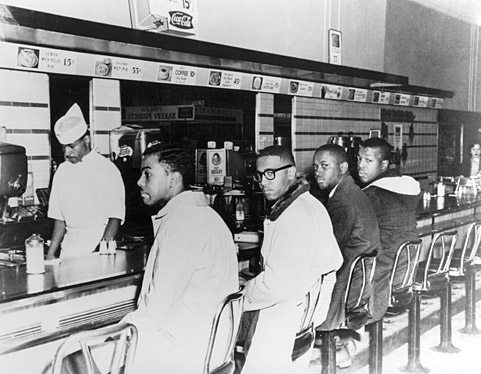Mayberry
Posted on July 5, 2012

There is a reason that the main character in the Andy Griffith Show was named Andy Taylor. The TV series was fiction.
Now that Andy Griffith died, his iconic show is being romanticized as an idyllic slice of small town America.
It was actually careful counterprogramming against what was actually happening in America, especially in southern small-town America. Mount Airy wasn’t all that far from Greensboro, North Carolina, where four students from a local historically black college protested Woolworth’s segregation policies by ordering coffee from a “whites-only” lunch counter in 1960. Coincidently, that was the year that “The Andy Griffith Show” debuted on CBS.
If you watched the Andy Griffith Show carefully, you could see some black faces in the crowd. And truth be told, in Mount Airy, blacks made up slightly less than 10 percent of the population.
But the black folks in the Andy Griffith Show never faced discrimination, never seemed to be lacking for employment, never had a tough time feeding their kids or making ends meet. The reality for many African-Americans in the south (or in the north for that matter) at the time was much different.
But the Andy Griffith Show was a situation comedy. It didn’t offer a biting social critique. It wasn’t on television to probe the issues of poverty, civil rights, social or economic equality, or anything else.
It was put on television to capture ratings, first and foremost. Second, it sent a gentle reminder to the rest of the country that not all southerners were like Bull Connor. And third, it presented an idealistic vision of what is the best in small town America.
That is all fine and good, and there is a place for fiction in our lives, even idealistic fiction.
But we should never mistake idealized fiction for reality.
And I think that is what people do far too often in America today. They idolize the past to condemn the present. This usually happens most acutely around the 4th of July.
Sure, the Founding Fathers were prescient in their construction of the Constitution, but they weren’t saints. Thomas Jefferson was smart and innovative, but he also had children out of wedlock with one of his slaves. Alexander Hamilton was a hothead and adulterer. Ben Franklin was an avid drinker and philanderer. John Adams was a crank.
America has plenty of warts. Someone said on a television show last week that America needed to return to the days when it only went to war for a just cause. When was that? It certainly wasn’t in 1812, when we used a common practice (impressment) as a pretext to try to seize Canada. It certainly wasn’t in 1846, when we used the Alamo as a pretext to invade Mexico and fulfill our Manifest Destiny. It certainly wasn’t 1898, when we misused the memory of the Maine, to seize Cuba and the Philippines. It wasn’t in 1964 when Lyndon Johnson used the Gulf of Tonkin affair to get us deeper in Viet Nam.
America is a great place to live for many, but not for all. It isn’t the safest place to live, especially if you live in Chicago. It doesn’t have the world’s best education system. Our infrastructure is breaking down, our highways are too crowded, and we don’t have a plan or the capacity to extend public transportation beyond our current capabilities. Sure, you can make money in America if you work hard, but you have to get some breaks too. There are plenty of success stories, but far too many people have no hope and no clue.
And yet, America is progressing. We are improving. We are moving forward. And we still have much more to offer.
The Tea Party guys like walking around talking about how they are going to take America back. Back to what?
America has some problems, certainly, but our problems were worse thirty years ago. Our air was much dirtier then. Poverty was much deeper. Far fewer people had air conditioning, television, and a roof over their heads. Crime was much worse in the 1990’s. Political corruption is bad today, but it was much worse in the Watergate years, not to mention at the hey day of Tammany Hall.
We are making progress as a country. Slowly but surely, we are making progress.
We don’t need to idolize the past. It can be useful, however, for society to find ways to comfort itself in the present with shows like Andy Griffith. Comfort was needed in the 1930’s, during the depths of the depression, when America flocked to the local movie theaters to escape the reality and the heat (the movie house was the first big gathering spot to have air conditioning. And it flocked to the small screen in the 1960’s to watch goofy shows like Gilligan’s Island, Petty Coat Junction and Hee-Haw. Sometime reality is over-rated.
“The Andy Griffith Show” would have been much better if it didn’t go out of its way to ignore the 10% of the black people who lived in Mount Airy in 1960 or ignore the colored kids that tried to eat lunch at the “white only” counter at Woolworth’s. The show didn’t have to be the fulcrum of civil rights debate, but it wouldn’t have hurt to have a few black folks have robust characters on the show, instead of just popping up in the background. It could have been entertaining and could have played a leading role in society.
